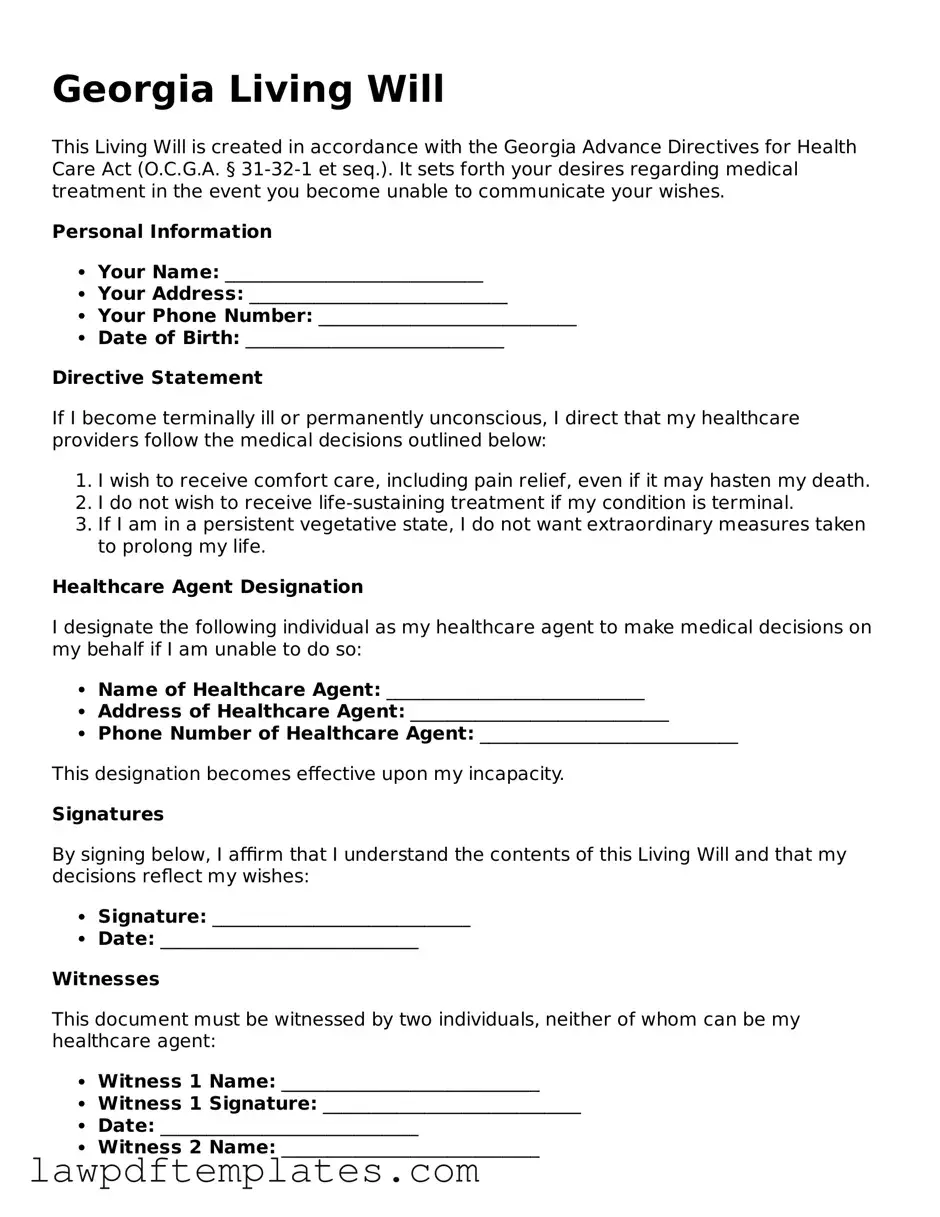Free Living Will Template for the State of Georgia
Form Breakdown
| Fact Name | Description |
|---|---|
| Definition | A Georgia Living Will is a legal document that outlines a person's wishes regarding medical treatment in case they become unable to communicate their preferences. |
| Governing Law | The Georgia Living Will is governed by the Georgia Advance Directive for Health Care Act (O.C.G.A. § 31-32-1 et seq.). |
| Eligibility | Any adult, 18 years or older, can create a Living Will in Georgia, provided they are of sound mind. |
| Witness Requirement | The form must be signed in the presence of two witnesses who are not related to the individual or beneficiaries of the estate. |
| Revocation | A Living Will can be revoked at any time by the individual, either verbally or in writing. |
| Healthcare Agent | While a Living Will specifies treatment preferences, it does not appoint a healthcare agent. For that, a separate document is needed. |
| Specific Treatments | The document can specify which life-sustaining treatments the individual does or does not want, such as resuscitation or mechanical ventilation. |
| Storage | It is advisable to keep the Living Will in a safe place and to share copies with family members and healthcare providers. |
| Legal Effect | Healthcare providers are required to follow the instructions outlined in the Living Will, as long as it is valid and applicable to the situation. |
Sample - Georgia Living Will Form
Georgia Living Will
This Living Will is created in accordance with the Georgia Advance Directives for Health Care Act (O.C.G.A. § 31-32-1 et seq.). It sets forth your desires regarding medical treatment in the event you become unable to communicate your wishes.
Personal Information
- Your Name: ____________________________
- Your Address: ____________________________
- Your Phone Number: ____________________________
- Date of Birth: ____________________________
Directive Statement
If I become terminally ill or permanently unconscious, I direct that my healthcare providers follow the medical decisions outlined below:
- I wish to receive comfort care, including pain relief, even if it may hasten my death.
- I do not wish to receive life-sustaining treatment if my condition is terminal.
- If I am in a persistent vegetative state, I do not want extraordinary measures taken to prolong my life.
Healthcare Agent Designation
I designate the following individual as my healthcare agent to make medical decisions on my behalf if I am unable to do so:
- Name of Healthcare Agent: ____________________________
- Address of Healthcare Agent: ____________________________
- Phone Number of Healthcare Agent: ____________________________
This designation becomes effective upon my incapacity.
Signatures
By signing below, I affirm that I understand the contents of this Living Will and that my decisions reflect my wishes:
- Signature: ____________________________
- Date: ____________________________
Witnesses
This document must be witnessed by two individuals, neither of whom can be my healthcare agent:
- Witness 1 Name: ____________________________
- Witness 1 Signature: ____________________________
- Date: ____________________________
- Witness 2 Name: ____________________________
- Witness 2 Signature: ____________________________
- Date: ____________________________
This Living Will remains in effect until revoked by me in writing.
Common mistakes
Filling out a Georgia Living Will form is an important step in ensuring that your healthcare preferences are respected when you are unable to communicate them. However, many individuals make mistakes that can lead to confusion or even unintended consequences. Understanding these common pitfalls can help you navigate the process more effectively.
One frequent mistake is failing to clearly define your wishes. The purpose of a Living Will is to outline your preferences regarding medical treatment in specific situations. If your instructions are vague or ambiguous, healthcare providers may struggle to interpret your intentions. It is essential to be as specific as possible about the types of treatments you do or do not want, especially in critical situations.
Another common error is neglecting to sign and date the document properly. A Living Will is only valid if it is signed by you and, in some cases, witnessed or notarized according to state requirements. Without these crucial steps, your Living Will may not hold up in a medical setting. Always double-check that all necessary signatures are in place before considering the document complete.
People often overlook the importance of discussing their Living Will with family members and healthcare providers. A Living Will is not just a personal document; it serves as a guide for those who may need to make decisions on your behalf. By having open conversations about your wishes, you can ensure that everyone understands your preferences and is prepared to advocate for them.
Lastly, some individuals fail to update their Living Will as their circumstances or preferences change. Life is dynamic, and so are our views on medical care. Regularly reviewing and, if necessary, revising your Living Will ensures that it accurately reflects your current wishes. Keeping your document up to date can prevent misunderstandings and ensure that your healthcare decisions align with your values.
Discover More Living Will Templates for Specific States
Living Will Template California - A Living Will can ease the burden on loved ones during emotionally challenging times.
For those looking to efficiently handle their transactions, the Washington Bill of Sale is indispensable, and you can conveniently find a template at PDF Documents Hub to ensure all necessary information is included for a successful transfer.
Advance Directive Michigan - Many healthcare systems encourage patients to create Living Wills as part of their intake process.
Nc Living Will Form - Choosing to create a Living Will empowers individuals in the face of serious health decisions.
